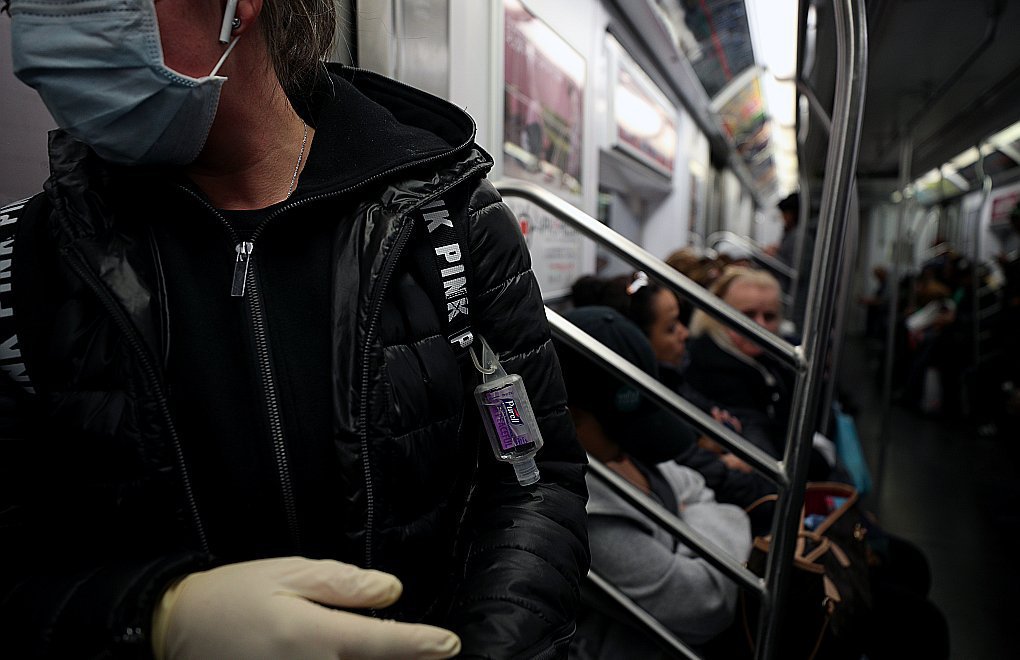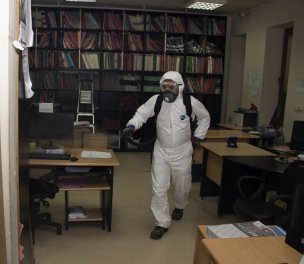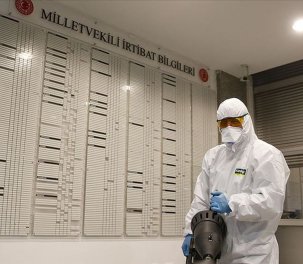* Photo: New York subway/AA.
Click to read the article in Turkish
Coronavirus originated in Wuhan, China last December. Since then 118,000 people have been infected with the virus as of today (March 12).
While the World Health Organization (WHO) declared coronavirus a pandemic yesterday, Turkey also confirmed its first first case of Covid-19, the new strain of the virus, in early morning hours on the same day.
But what is the mortality rate of coronavirus around the world? How many people have recovered from the virus so far? Who is at risk the most? What is the mortality rate by gender, medical history and age?
We have compiled some of these statistics for you...
How many patients have recovered?
In his media briefing on Covid-19, Tedros Adhanom, the WHO Director General, announced the recent figures in following words:
"In the past two weeks, the number of cases of COVID-19 outside China has increased 13-fold, and the number of affected countries has tripled.
"There are now more than 118,000 cases in 114 countries. 4,291 people have lost their lives. Thousands more are fighting for their lives in hospitals."
The most recent figures have shown that 68,314 people who contracted coronavirus have recovered and its mortality rate is 3.4 percent.

* Source: World Meter.
Physicians and scientists are of the opinion that 5-40 our of every 1,000 infected people have lost their lives due to coronavirus.
According to a study conducted by the UK-based Imperial College, the death toll can be calculated differently by different countries.
Who is at greater risk?
Even though the current number of cases does not point at a single group, the number of people who have died of the virus give clues about which groups are at risk the most?
To put it in simpler terms, the mortality risk seems higher among the ones over the age of 80, those who have health disorders and men.
However, it is important to note that these figures are applicable only for now, considering that in a preliminary study conducted on 44,000 cases in China, the mortality risk of the elderly in comparison with middle-aged people was 10 times higher than the figures announced today.
Rates by age groups
| AGE GROUP | MORTALITY RATES (All cases) |
| 80+ | 14.8% |
| 70-79 | 8.0% |
| 60-69 | 3.6% |
| 50-59 | 1.3% |
| 40-49 | 0.4% |
| 30-39 | 0.2% |
| 20-29 | 0.2% |
| 10-19 | 0.2% |
| 0-9 | No deaths |
* Source: Worldometers.
Rates by gender groups
| GENDER | MORTALITY RATES (Confirmed cases) | MORTALITY RATES (All cases) |
| WOMEN | 4.7% | 2.8% |
| MEN | 2.8% | 1.7% |
* Source: Worldometers.
Rates by medical histories
| MEDICAL HISTORY | MORTALITY RATE (Confirmed cases) | MORTALITY RATE (All cases) |
| Cardiac diseases | 13.2% | 10.5% |
| Diabetes | 9.2% | 7.2% |
| Chronic respiratory disorders | 8.0% | 6.3% |
| High blood pressure | 8.4% | 6.0% |
| Cancer | 7.6% | 5.6% |
| Healthy cases | 0.9% |
* Source: Worldometers.
How to protect oneself from the new Coronavirus?According to the World Health Organization (WHO), the protective measures against the new coronavirus (Covid-19) can be briefly listed as follows: Wash your hands frequentlyRegularly and thoroughly clean your hands with an alcohol-based hand rub or wash them with soap and water. Why? Washing your hands with soap and water or using alcohol-based hand rub kills viruses that may be on your hands. Maintain social distancingMaintain at least 1 metre (3 feet) distance between yourself and anyone who is coughing or sneezing. Why? When someone coughs or sneezes they spray small liquid droplets from their nose or mouth which may contain virus. If you are too close, you can breathe in the droplets, including the COVID-19 virus if the person coughing has the disease. Avoid touching eyes, nose and mouthWhy? Hands touch many surfaces and can pick up viruses. Once contaminated, hands can transfer the virus to your eyes, nose or mouth. From there, the virus can enter your body and can make you sick. Practice respiratory hygieneMake sure you, and the people around you, follow good respiratory hygiene. This means covering your mouth and nose with your bent elbow or tissue when you cough or sneeze. Then dispose of the used tissue immediately. Why? Droplets spread virus. By following good respiratory hygiene you protect the people around you from viruses such as cold, flu and COVID-19. If you have fever, cough and difficulty breathing, seek medical care earlyStay home if you feel unwell. If you have a fever, cough and difficulty breathing, seek medical attention and call in advance. Follow the directions of your local health authority. Why? National and local authorities will have the most up to date information on the situation in your area. Calling in advance will allow your health care provider to quickly direct you to the right health facility. This will also protect you and help prevent spread of viruses and other infections. |
(PT/SD)
* Sources: BBC News, World Meter, Worldometers.














